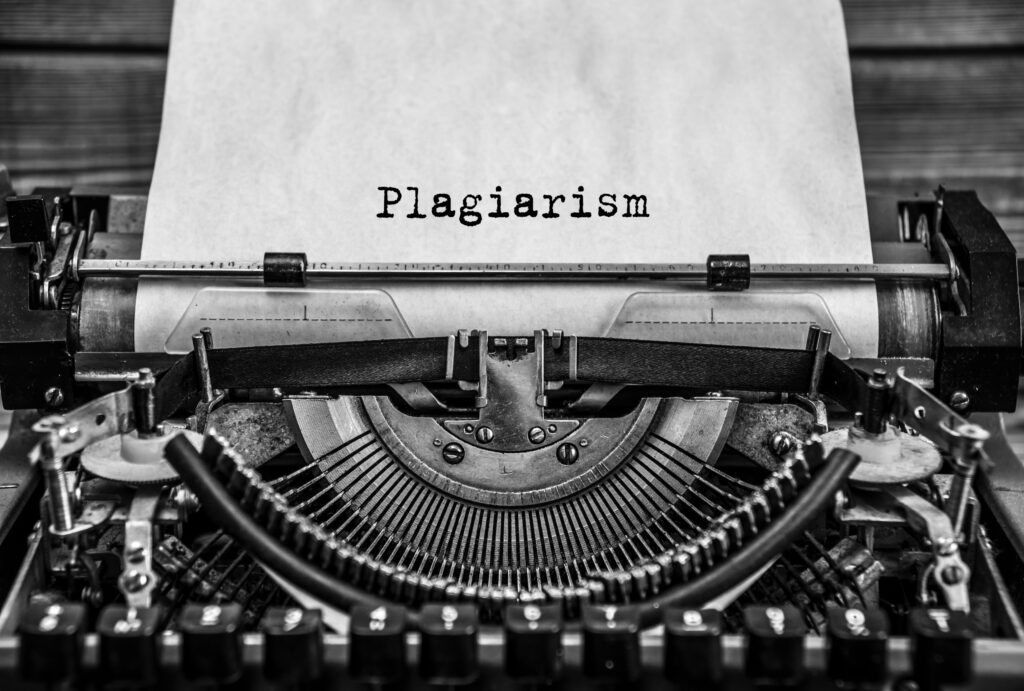“It All Depends on Context”
In The Spectator.com, Peter W. Wood refers to the song “Auld Lang Syne,” meaning “for the sake of old times., a phrase hardly in need of explanation on New Year’s Eve. Robert Byrns wrote Auld Lang Syne in 1788, after reportedly hearing it from an old man. Mr. Wood wonders, was that plagiarism? There are older versions of this song, but the versions we sing are mostly Burn’s, continues Mr. Wood.
The melody we use comes is a traditional Scottish dance.” If you try appending this after the last boozy chorus and kiss, you may not be invited to next year’s party.
As Harvard’s progressive president Claudine Gay told us, “It all depends on context.”
Repeating other people’s words without attribution is at the heart of many liturgies. Your own free-form paraphrase of the Lord’s Prayer would be awkward in the services of most Christian denominations. And giving credit to the designer, architect or craftsman occurs only in special situations. “Yes, this is a Frank Lloyd Wright house,” or, “My dress is by Oscar de la Renta.”
Peter Wood’s Observations
The academy — the university in the broadest sense — is an old institution, but not as old as song, music, folktales, gossip or even history and philosophy. Part of what distinguishes the university from those other channels of communication is its dedication to joint pursuit of truth. We work together to figure out the best answers to some of the mysteries of the world. The mysteries that most concern us are the ones that look like they are solved by persistent intellectual inquiry. That means sharing what we know along with the reasons we think we are right and our reflections on what others have said. That puts us into a dialogue with others who have done the same.
This dialogue may have no end. We do our best and pass the matter along to the next generation, which may do better. There is no final word for many of the matters we address, but collectively we hope to get closer to what’s real and what’s true.
Breaking the Links in the Truth Chain
Plagiarism is a problem because it breaks the links in that chain. The stolen idea, the purloined quotation and the missing citation send us back into the fog of rumor and gossip. How are we to make progress if, “All the truths of the world add up to one big lie?” That patient and steady search for truth becomes a ride in the getaway car of postmodernism. It is thrilling perhaps, but it ends in the badlands.
Learning the art of properly engaging other people’s thoughts and citing them by name is a powerful resource for the individual.
Mastering this art isn’t natural or easy. It takes some concentrated effort, and college is the one place where that skill can be effectively learned. A lawyer needs to cite accurately real legal cases. ChatGPT and similar AI technology may provide assistance, but ChatGPT also seems to conflate real laws with fictional ones — and even invents citations for these fictions. That puts the burden on the student to develop his discernment early on. Freshman English, if not sooner.
Fortunately, not all students are destined to be lawyers, but all students who hope to play some meaningful part in our complex society need to develop that lawyerly skill of thinking through what others have thought and said.
A Bankrupt Concept
Why does Mr. Wood avoid using the phrase “critical thinking”? It’s a phrase “ubiquitous in American higher education.” To Wood it “generally involves misleading ideas about what’s “critical.” It hardly requires any thinking at all.
It is a catch-all phrase for criticizing people and institutions by deploying popular clichés. Splashing tomato soup on a famous painting in a museum is not “critical thinking.” It is simply vandalism. And teaching students that Western civilization is founded on oppression and expropriation is also vandalism.
… critical thinking in the true sense is indeed part of what makes the university the university. And to think critically is to think with the utmost serious attention about the sources which warrant your attention. We inevitably grant authority to some views and doubt others, and often we find both views within the works of a single author. Disentangling this play of light and shadow is what critical thinking really entails.
Harvard Fails
It fails when we fail to recognize that “the plagiarist deals in counterfeit authority.”
There are to be sure many things worse than plagiarism. Murder is worse, and mass murder is heinous. Rape is worse, and mass rape is an abomination. Kidnapping is worse. Torture is worse. Propagandizing in support of such things is worse.
Civilization demands that we respond effectively to such crimes.
But civilization also demands that we do our best to uphold the central institutions that sustain civilization across the generations, and the university is among those institutions — perhaps first among them. Within the university exist several pillars that make its complex enterprise work. Intellectual freedom is one of them; personal responsibility is another; division of labor yet another. I wouldn’t want to elevate the rules against plagiarism as the standalone guarantor of the university’s integrity. But they are indispensable.
Without those rules, the university is just babble pretending to be true speech. And that’s why Claudine Gay must go.






